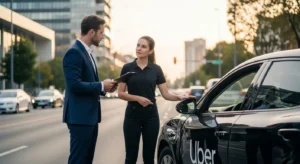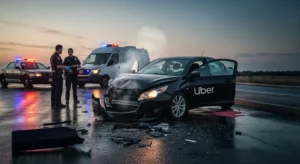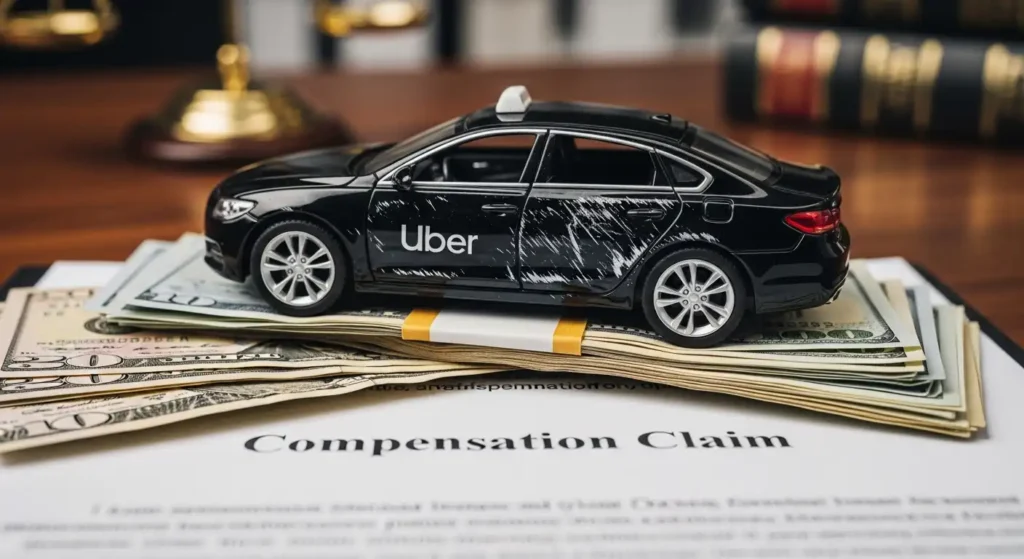Getting into an accident while riding in an Uber can leave you facing unexpected injuries, medical bills, and lost wages. Understanding the process of winning compensation after an Uber accident is essential to protect your health and finances. Rideshare accidents bring unique legal and insurance challenges that can complicate recovery. Insurance coverage often depends on the driver’s activity at the time of the crash, making it critical for you to know exactly what rights and options you have.
Knowing where to start makes all the difference. This guide walks you through:
- Key facts about Uber accident compensation
- How insurance coverage changes based on driver status
- The types of damages available in rideshare accident claims
- Steps to take immediately after a crash
- Navigating liability and working with experienced attorneys
By the end, you’ll be equipped with practical steps and expert guidance to help maximize your compensation after an Uber accident.
Understanding Uber Accident Insurance Coverage
 Uber insurance coverage changes depending on the driver’s status at the time of the accident. Knowing which phase applies is critical for anyone involved in a rideshare collision.
Uber insurance coverage changes depending on the driver’s status at the time of the accident. Knowing which phase applies is critical for anyone involved in a rideshare collision.
1. Offline
When an Uber driver is not logged into the app, only their personal auto insurance applies. Uber provides no coverage in this scenario.
2. Available or Waiting for a Ride Request
If the driver is online but hasn’t accepted a ride, Uber’s third-party liability insurance kicks in. This usually offers up to $50,000 per person for bodily injury, $100,000 per accident, and $25,000 for property damage—provided the driver’s own policy doesn’t cover these costs.
3. En Route to Pick Up or Carrying Passengers
The highest level of Uber commercial insurance is in effect. This includes up to $1 million in liability coverage, uninsured/underinsured motorist protection, and contingent comprehensive and collision coverage (subject to a deductible). This robust policy is designed to protect both passengers and third parties.
Personal auto policies often exclude accidents occurring during rideshare activity. Drivers who rely solely on their private insurance may discover their claims denied if they were active on the app or transporting passengers.
Identifying which rideshare insurance policy applies after an accident determines who pays for damages and how much compensation you can claim. Reviewing the exact timing and circumstances of the crash helps clarify your legal rights and financial options.
Common Types of Damages in Uber Accident Claims
Understanding the types of damages you can claim after an Uber accident is essential for securing the compensation you deserve. Claims typically fall into three primary categories: economic damages, non-economic damages, and punitive damages.
1. Economic Damages
These cover your direct financial losses. You can recover:
- Medical bills (emergency care, surgeries, follow-up visits)
- Lost wages from missed work
- Property damage (vehicle repairs, replacement of personal items)
- Rehabilitation costs (physical therapy, long-term medical support)
Accurately documenting these expenses is critical. Save every bill, receipt, and pay stub connected to your injuries or losses.
2. Non-Economic Damages
Not every loss shows up as a number on a receipt. Non-economic damages include:
- Pain and suffering from physical injuries
- Emotional distress, such as anxiety or PTSD, after the crash
- Loss of enjoyment of life if injuries prevent you from daily activities or hobbies
Courts and insurers consider the severity and lasting impact of your injuries when valuing non-economic damages.
3. Punitive Damages in Uber Accidents
Punitive damages are rarely awarded but may apply when a driver’s behavior goes beyond ordinary negligence—such as drunk driving or intentionally causing harm. These are designed to punish egregious conduct and deter similar actions by others.
Each category plays a unique role in your compensation claim. Properly identifying and proving all relevant damages boosts your chances for a fair settlement.
Steps to Take Immediately After an Uber Accident
 Knowing the right post-Uber accident steps is critical for protecting your rights and building a strong compensation claim. Immediate action sets the foundation for a successful outcome in any Uber accident case.
Knowing the right post-Uber accident steps is critical for protecting your rights and building a strong compensation claim. Immediate action sets the foundation for a successful outcome in any Uber accident case.
1. Prioritize Safety and Medical Attention
Move to safety, assess injuries, and seek medical help if needed.
- Move to a safe location if possible.
- Check yourself and others for injuries.
- Seek prompt medical care, even if injuries seem minor—adrenaline can mask symptoms that appear later.
2. Report the Accident Promptly
Notify authorities and use the Uber app to report the incident.
- Notify local authorities by calling 911; a police report creates an official record.
- Use the Uber app to report the incident. This activates Uber’s internal claims process and documents your involvement.
3. Collect Crucial Evidence at the Scene
Gather evidence such as photos, witness information, and police report details.
- Take clear photos of all vehicles, license plates, visible injuries, street signs, and road conditions.
- Gather contact information for witnesses and everyone involved.
- Request a copy or reference number for the police report.
4. Maintain Detailed Records
Keep track of all accident-related expenses and document your injuries.
- Keep receipts for all accident-related expenses: medical bills, prescriptions, vehicle repairs, and rideshare receipts.
- Document your injuries with dated photos and detailed notes describing pain levels and limitations.
Thorough accident evidence collection increases your chances of winning compensation after an Uber accident. Every detail matters when presenting your claim or negotiating with insurers.
Navigating Liability in Uber Accident Cases
Understanding rideshare liability is critical when seeking compensation after an Uber accident. Uber drivers are classified as independent contractor drivers, not employees. This distinction means Uber is typically not vicariously liable for a driver’s negligence during an accident. You usually cannot sue Uber directly for the driver’s actions unless there is evidence of gross negligence in hiring or retaining a driver.
Who Can Be Liable in an Uber Accident?
Liability can involve several parties:
- The Uber Driver: If the driver caused the accident, their personal auto insurance and/or Uber’s commercial policy may come into play, depending on their status during the crash.
- Third Parties: Other motorists, cyclists, or even pedestrians can share fault if their actions contributed to the incident.
- Passenger Claims: Passengers in the rideshare vehicle often have claims against both the Uber driver and other involved parties.
The Complexity of Multi-Party Claims with Uber
Multi-party claims with Uber often lead to complex negotiations. Insurance carriers will investigate each party’s degree of responsibility before offering settlements. If liability is disputed or shared among multiple parties, compensation can be affected—sometimes delaying resolution or reducing payouts. Strong documentation and legal guidance are essential for clarifying fault and maximizing recovery in these situations.
The Role of Settlement Negotiations
Settlement negotiations reflect these complexities; insurers may try to shift blame or minimize payouts based on perceived liability splits. Clear evidence and legal advocacy help keep your claim moving forward as you seek fair compensation.
Working with Experienced Rideshare Accident Attorneys
 Partnering with a skilled Uber accident lawyer gives you critical advantages at every stage of your claim. Legal professionals specializing in rideshare cases understand how to investigate complex accident scenes, gather evidence from multiple sources, and pinpoint liable parties—especially when fault is disputed or multiple insurers are involved.
Partnering with a skilled Uber accident lawyer gives you critical advantages at every stage of your claim. Legal professionals specializing in rideshare cases understand how to investigate complex accident scenes, gather evidence from multiple sources, and pinpoint liable parties—especially when fault is disputed or multiple insurers are involved.
Key benefits of rideshare legal representation include:
- Thorough Investigation: Attorneys collect vital documentation such as dashcam footage, phone records, and witness statements. They also work with accident reconstruction specialists when needed to build a strong liability case.
- Negotiation & Litigation: Insurance adjusters often attempt to minimize payouts. An experienced lawyer negotiates assertively on your behalf and, if necessary, files a lawsuit to pursue full compensation through the courts.
- Meeting Deadlines: States like Georgia impose a two-year statute of limitations for injury claims. Missing this deadline can cost you the right to recover damages, making timely legal action essential.
- Maximizing Compensation: Lawyers know how to calculate both current and future losses, including non-economic damages, and identify opportunities for punitive awards if gross negligence played a role.
Hiring a rideshare attorney not only brings professional firepower into your corner but also sends a clear signal to insurers that you expect a fair settlement grounded in law and evidence.
Factors Influencing Settlement Amounts After an Uber Accident
Uber settlement amounts can differ dramatically, shaped by multiple elements unique to each case. Injury severity stands out as the most significant factor. For minor injuries—such as whiplash, bruises, or temporary discomfort—settlements typically range from $10,000 to $50,000. When injuries are more severe, like traumatic brain injuries, spinal damage, or permanent disability, settlements may exceed $100,000 and can reach up to $1 million or higher.
Other key factors affecting compensation include:
- Medical expenses: Hospital bills, surgeries, ongoing therapy, prescription medications
- Lost income: Time missed from work or diminished earning capacity due to long-term effects
- Emotional distress: Chronic pain, PTSD symptoms, loss of enjoyment of life
Clarity in documentation plays a direct role in settlement outcomes. Keeping organized records of treatments, bills, communications with insurers, and evidence of lost wages leaves little room for dispute when calculating claim value.
Legal representation also has a measurable impact. An experienced attorney will know how to present evidence that accurately reflects the toll of the accident on your life and future. Strong advocacy during negotiations frequently leads to higher settlement offers and better protection of your interests.
A thorough approach—combining detailed documentation and skilled legal support—ensures you pursue every dollar you’re entitled to after an Uber accident.
Conclusion
Securing fair compensation after an Uber accident often depends on the actions you take and the professionals you involve. Dealing with insurance complexities, liability disputes, and damage assessments requires more than just basic knowledge of rideshare policies. An experienced attorney can analyze every detail, from accident reports to medical documentation, and advocate for the highest settlement possible.
- Skilled legal support increases your chances of winning compensation in an Uber accident claim.
- Attorneys know how to handle negotiations with insurance companies that might otherwise delay or undervalue your claim.
- Statute of limitations laws create strict deadlines—missing them could jeopardize your right to recover damages.
The key to winning compensation after an Uber accident is clear: legal guidance gives you a strategic edge, helping you avoid common pitfalls and maximize your recovery. This approach positions you to address each challenge confidently as you move forward through the claims process.
Quick Tips for Navigating Uber Accident Claims Successfully
- Act quickly after an accident: Prioritize safety, seek immediate medical attention, and report the incident to both local authorities and through the Uber app.
- Gather strong evidence: Take photos of the scene, collect witness information, and secure a copy of the police report for your records.
- Track all expenses: Maintain detailed documentation of medical bills, lost wages, property damage, and any other losses related to the accident.
- Know your insurance coverage: Insurance protection changes based on whether the Uber driver was waiting for a ride, carrying passengers, or offline. Identifying which policy applies is essential for winning compensation after an Uber accident.
- Consult with experienced legal counsel: Rideshare accident claims are complicated. Skilled attorneys can maximize your settlement by navigating complex liability issues and working within strict deadlines.
Keeping these quick tips for Uber accident claims in mind helps protect your rights and strengthens your case from day one.

